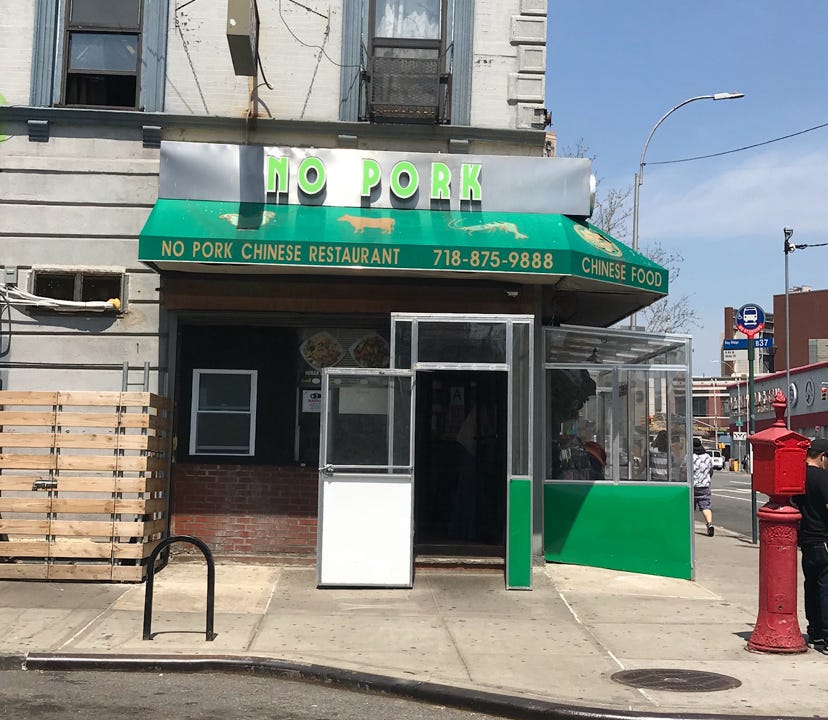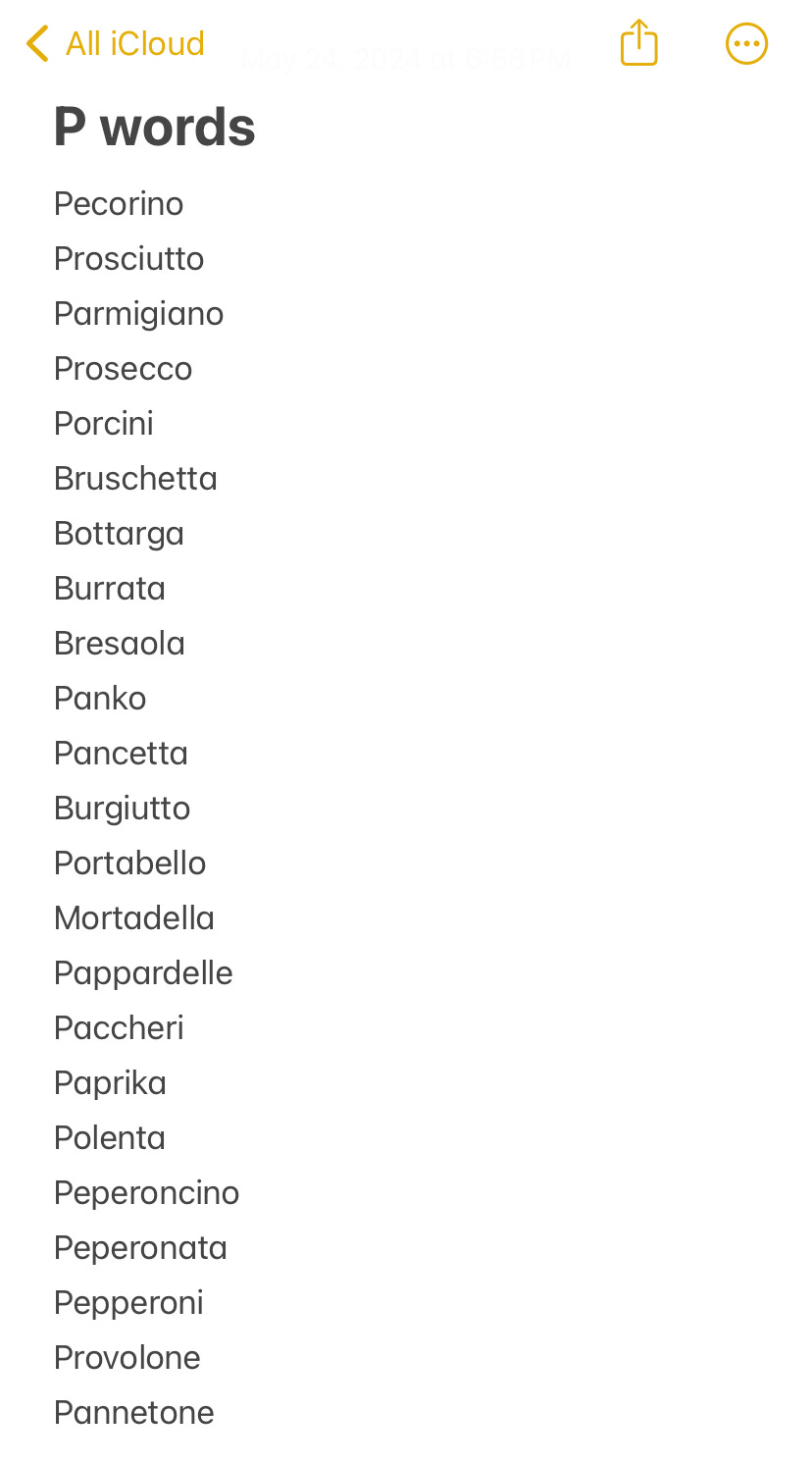Hi there,
Whenever my parents and I eat out for dinner, a song-and-dance plays out, in the form of now perfunctory precautions, as we navigate how best to avoid menu items containing pork. This is a particularly likely scenario when we are not eating at one of their go-to Afghan, Persian, or Turkish spots, which are certified halal. I wasn't raised as a notably observant Muslim, but when it came to pork? That was always off the table, quite literally. My parents instilled in me early the urgency to always write "no pork" on forms asking about my dietary restrictions, to decline the pepperoni slice at school birthday parties, to ask if dishes consisted of pork at outside functions or other people's houses, and to explain, if asked, that this line of questioning was for strictly religious purposes. While my parents procure their at-home cooking meat from a Pakistani halal grocer a few towns away, they are fine with eating non-halal chicken or lamb when eating out. Pork, though, will always fall squarely in the "haram" bucket, a culturally embedded non-negotiable.
At my parent's local Chinese spot, there is always an expected yet subdued panic that rises once we are seated and have begun to scan the menu, a situation whose unease is perceptible only to those in the know (i.e. me). Whether it's green beans, eggplant in garlic sauce, cold sesame noodles, or mapo tofu, these are all dishes that have the potentiality of being sprinkled with pork. Therefore at the time of ordering, an anticipated moment ever fast approaching, "no pork" would need to be clarified in a confident and unintentionally overbearing tone; a soliloquy would need to be delivered to make extra sure that the "no pork" message went through, loud and clear. The appointed family member taking the ordering reins knows to state the words "no pork" after each and every ordered item, just to be on the safe side.
Green beans, no pork.
Eggplant in garlic sauce, no pork.
Cold sesame noodles, no pork.
Mapo tofu, no pork.
Chicken with chili peppers…no pork.
This inadvertent ordering ritual made such an impact on the people working at this restaurant that once, when my mom called to amend a pick-up order, the person on the other end figured that the easiest way to confirm the caller was by asking if this was "Sameera 'no-pork'" on the line.
"Yes, this is she..."

Sometimes at restaurants, a level of uncertainty remains even after the meal is served. Any dots of dark red reminiscent of the P product sound the alarm bells, familiar and inevitable, prolonging a collective internal cacophony at our table: one that refuses to dissipate until we've confirmed that there can't possibly be any of the dreaded component in the dish.
"What is this?" my mom will push the questionable morsels around with her fork, almost ready to call the waiter back. "Oh, it's a shallot.”
A soy bean, another time. An unidentifiable pickled veggie, or a well-browned allium, on other occasions.
Once all suspicions have been eliminated and all of us have agreed that there are no reasons to extend the state of frenzy to any other parties or for another second longer, dining out with my family is a satisfying and relaxed affair.
Qualms about the P word extend to realms beyond dining, and even cast a shadow upon the actual animal, yet another P word. Regarding the former, I'm sure the only issue my parents would have had in my marrying a person with a non-Muslim background would be if his last name had been Bacon. (Thankfully for all, it is not.) And regarding the latter, my mom is always trying to understand the boundaries of other family members' religiosity when it comes to the P word and its connotations. Last year, I bought some picture books with the character Peppa Pig for my cousin Aisha's toddlers. My mom genuinely wondered if Aisha would be offended by this gift.
No, she won't be, I assured her: the very intentional purchase was a result of Peppa Pig being one of their favorite shows and characters.
Back in the restaurant department, decoding Italian restaurant menus in light of the P word—and indeed a plethora of P words—has often proven to be an operation. Italian restaurants, family favorites for outings and special occasions, boast menus full of words that could well be either a pasta or a pork product. These words get my mom's worry wheels turning.
"Paccheri"—what's that?!
Is "porcini" pork, a mushroom, a cheese...or something else? […Press 1, 2, or 3, or stay on the line while we reach a representative...]
How about "mortadella?" ...“portobello”?
Is "peperoncino" fancy Italian for pepperoni?! What about "peperonata”?!
Wait! This has "burrata"..! Oh...that's the cheese your dad loves.
Insia, can we eat "provolone"?
Such are the regular questions that I field at an Italian restaurant, where I have to reassure my mom that the second half of "cacio e pepe" is not in fact an abbreviation for pepperoni. (It’s Italian for pepper.)
One time my parents and I were at dinner at an American bistro-style place in the neighborhood, where sandwiches, pizzas, pastas, and the like were the entree options. The waiter greeted us, sunnily running down the evening’s specials. One of them appealed to my mom. It might have been a pasta or a pizza...I can't quite remember now. However, what I will always remember is that one of the components starring in this special of the day was a total mystery to us.
The waiter shared that the dish was served with "burgiutto."
"Burgiutto." We all said this word out loud, one by one, staggering our contemplations of this new terminology.
"'Burgiutto?' What's that? It's not pork, is it?"
"No I'm pretty sure it's cheese….yes...it's a cheese topping!" the waiter said.
"You're sure it's not pork?" my mom asked one last time of the waiter. "Okay, we don't eat pork," my mom confirmed one actual final time.
I told my mom that I hadn't heard of burgiutto...There are so many cheeses out there, though— it's normal that we haven't heard of all of them.
Now, the average 10-15 minutes between ordering and serving came and went. Our dishes arrived, and we all got ready to dig in.
Except something looked suspiciously dark red. "Okay, Ammi...please don’t call back the waiter just yet: you know it’s never anything to worry about."
I knew my line in this play. Except that this time the dark red bits looked notoriously pork-like, triggering the alarms, even louder and clearer this time around.
After showing great restraint, we finally decided to flag down the waiter.
"Excuse me, this looks like pork. Please check what this is…we don't eat pork!"
The waiter went to the back to check, and returned with a starkly alternate ending to our typical story, where a mere diced red onion might be the usual culprit.
"I'm SO sorry. It's not 'burgiutto'....it's.….'prosciutto'."
It turned out that the ingredient that had been a mystery to us all was originally a mystery to the waiter himself. Coming from a Jewish strictly Kosher upbringing, he told us he wasn't familiar with prosciutto. Prosciutto for me, on the other hand, was a word I'd learned to combat with a negative response. By slightly mispronouncing an ingredient and convincing himself (and us) it was cheese, our waiter unwittingly played right into my parents' nightmare restaurant scenario: one never before written and finally come to pass.
Since that accidentally notable meal, I've started collecting Italian menu “P words” (and “B words”) on a note on my phone, occasionally administering a pop quiz to my mom (or anyone else who wants to play) to see if she can tell me which ones are pork, cheese, or something else.
As you can see, I've kept the legendary "burgiutto" on the list, for old time’s sake. (Also just realizing I could add “panini” to the line-up…)
This exercise reminds me of one of my favorite silly quizzes to circulate the internet in the past decade: Is it a pasta or an Italian composer?
And on a little more of a tangent, here's a similar style of quiz, a pandemic-era link...and a surprising confidence killer: Antidepressants or Tolkien character?
Let’s see how well you do!
Have a wonderful week, and until soon,
Insia







Loved it!
Very amusing. You captured the family paranoia for the P word perfectly ❤️